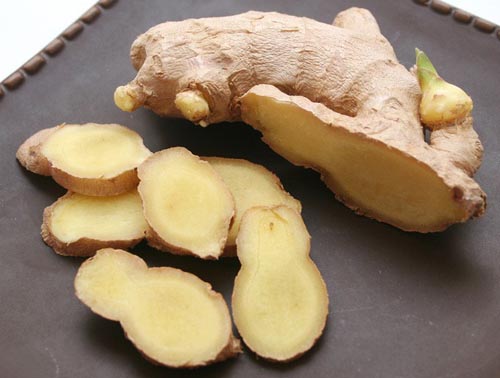VARIANT NAMES: Fresh Ginger, Dried Ginger, Junjiang, Baijiang (White Ginger).
ORIGIN: The dried or fresh rhizome of Zingiber offcinale [Zingberaceae].
CHEMICAL COMPOSITION: Containing volatile oils such as zingiberene, phellandrene, camphene, shogaol, gingerol, zingerone, borneol, zingiberol and citral, and resin and starch.

NATURE, FLAVOR AND CHANNEL TROPISM: Fresh ginger is pungent in flavor and slight warm in nature, while the dried one pungent in flavor and hot in nature, both act on the channels of the spleen, stomach and lung.
EFFICIENCIES AND INDICATIONS: Fresh ginger has the functions of relieving exterior syndrome, dispersing cold, arresting vomiting and resolving sputum, and is indicated for cold, vomiting and productive cough of wind-cold type. Dried ginger functions in warming the middle-jiao and eliminating pathogenic cold, recuperating depleted yang and promoting blood circulation. It is used to treat cold-pain in the chest and stomach, vomiting and diarrhea due to Erosive Gastritis, cold extremities and faint pulse, Asthma and cough due to fluid retention of cold type, arthralgia due to wind-cold-dampness, hemoptysis, Nasal-Bleeding and hemafecia due to Ulcerative Colitis.
DIRECTIONS: To be decocted for oral administration, or used as seasoning or cooked together with vegetables. It can also be sliced for moxibustion at acupuncture points. It should be avoided by a patient who manifests the syndromes of interior heat due to yin deficiency or bleeding due to blood-heat.

![Diseases, Symptoms, tcm, [tcmwindow.com]](/uploadFile/adImg/2015/4/24/6de633b8-0a7a-4546-868a-02389edf5c65.png)





